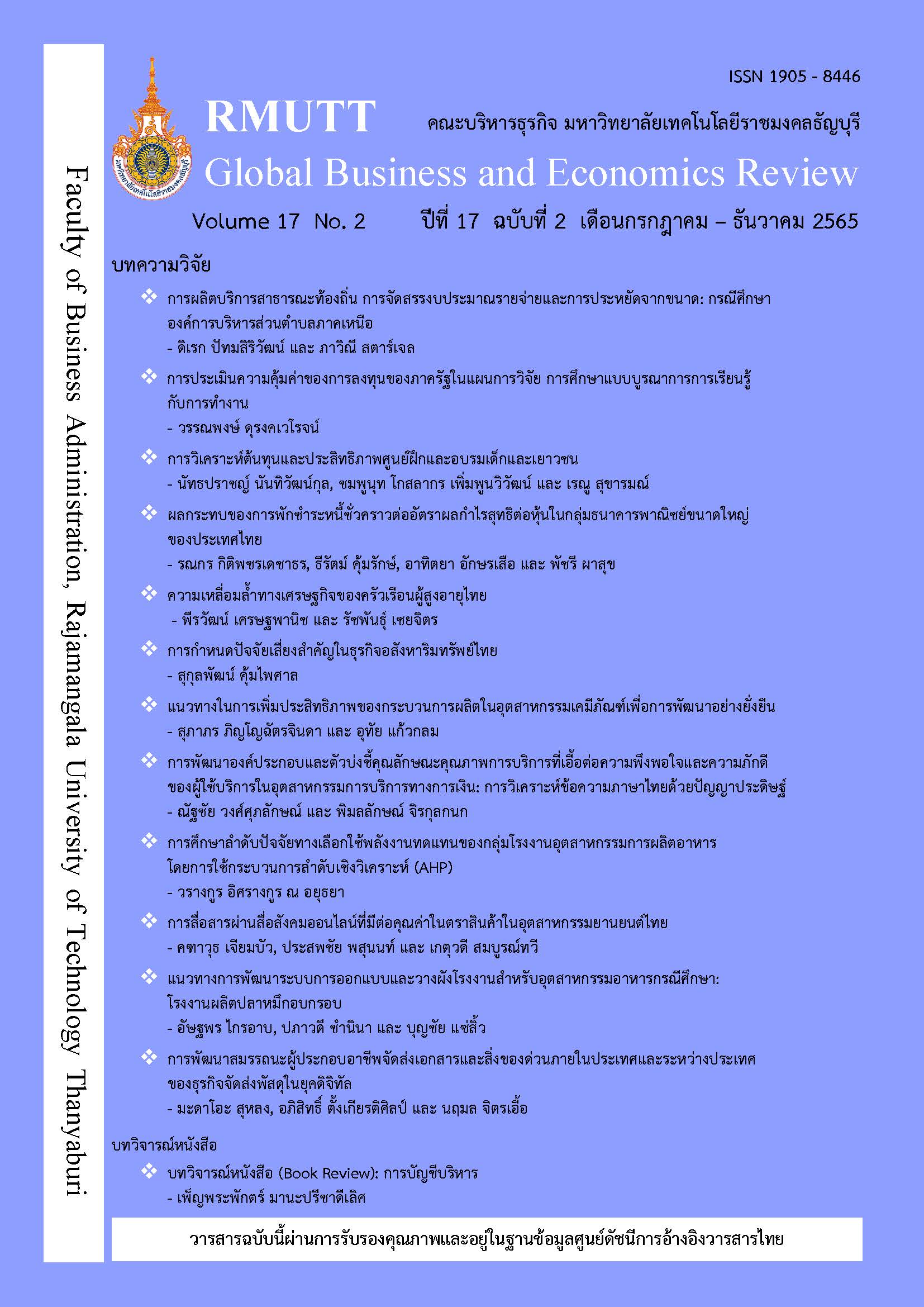THE DEVELOPMENT OF DOMESTIC AND INTERNATIONAL EXPRESS DELIVERY PROFESSIONALS IN THE DIGITAL AGE OF PARCEL DELIVERY BUSINESS
Keywords:
Professional Competence, Transportation, Express Parcels, ProfessionalAbstract
This research aimed to promote and support to development of the professional group of couriers and express items within the country and between the countries of the parcel delivery business that corresponds to the needs of entrepreneurs and is accepted in all sectors, both domestically and internationally. international level and can increase the competitiveness in the logistics field to be more efficient to support the transformation of entrepreneurship in the digital and develop skills Knowledge and expertise of those in the express delivery profession in the digital age and prepare as a standard for the performance of professionals in the digital age of express delivery. The study applied Key Analysis of functions, arranged the Functional Map that consisted of the Key Purpose, Key Role, Key Function and Unit of Competency which consisted of the Element of Competency and Performance of Criteria, Range Statement and Evidence Requirement The further development toward professional standard and level of professional qualifications. The results showed that occupational standards and professional qualifications in logistics. The export documents and express parcel management division consists of 13 competencies and 46 sub competencies, divided into 3 qualification Levels. Import documents and express parcels management consists of 6 competencies and 18 sub competencies which are divided into 2 qualification levels and export and import management consists of 10 competencies and 28 sub competencies divided into 2 qualification levels.
References
สำนักงานสภาพัฒนาการเศรษฐกิจและสังคมแห่งชาติ. (2563). รายงานโลจิสติกส์ของประเทศไทย ประจำปี 2563. สืบค้นจาก https://www.nesdc.go.th/ewt_dl_link.php?nid=11803
กรมเจรจาการค้าระหว่างประเทศ. (2563). รายงานฉบับสมบูรณ์เรื่องการเปิดเสรีโลจิสติกส์อาเซียน: โอกาสผลกระทบและการปรับตัวของผู้ประกอบการไทย. กรุงเทพฯ: กรมเจรจาการค้าระหว่างประเทศร่วมกับสถาบันนานาชาติเพื่อเอเชียแปซิฟิกศึกษา.
กองยุทธศาสตร์การพัฒนาระบบโลจิสติกส์ สศช. (2564). ภาวะเศรษฐกิจไทยไตรมาสที่สองของปี 2564 และแนวโน้ม. กรุงเทพฯ: สำนักงานเศรษฐกิจอุตสาหกรรม กระทรวงอุตสาหกรรม.
ธริรี มณีศรี. (2563). สถานการณ์ความท้าทายของผู้ให้บริการโลจิสติกส์ไทยในยุค. สืบค้นจาก http://dspace.spu.ac.th/bitstream/123456789/6349/1/TTLAoutlook.pdf
นิวรัตน์ วิจิตรกุลสวัสดิ. (2561). กลยุทธ์การจัดการโลจิสติกส์ 4.0 กับการปรับตัวของผู้ประกอบการไทยในยุคอุตสาหกรรม 4.0. พัฒนาเทคนิคศึกษา, 30(106). 28-36.
วัชระ วัธนารวี และ ภูมิพัฒณ์ มิ่งมาลัยรักษ์. (2562). การวิเคราะห์องค์ประกอบเชิงยืนยันประสิทธิภาพการจัดการโลจิสติกส์ของธุรกิจการค้าข้ามแดนเชียงราย. เชียงราย: มหาวิทยาลัยแม่ฟ้าหลวง.
สถาบันคุณวุฒิวิชาชีพ (องค์การมหาชน). (2559). มาตรฐานอาชีพและคุณวุฒิวิชาชีพ. สืบค้นจาก https://www.tpqi.go.th/th/qualification
สำนักงานคณะกรรมการพัฒนาการเศรษฐกิจและสังคมแห่งชาติ. (2564). การพัฒนาระบบโลจิสติกส์ของประเทศไทย ฉบับที่ 3 (พ.ศ.2560-2564). กรุงเทพฯ: สำนักงานฯ.
สำนักงานนโยบายและแผนการขนส่งและจราจร. (2560). แผนยุทธศาสตร์กระทรวงคมนานาเพื่อสนับสนุนการพัฒนาระบบโลจิสติกส์ของประเทศ พ.ศ.2556-2560 ของกระทรวงคมนาคม. กรุงเทพฯ: สำนักแผนงานกลุ่มโลจิสติกส์การขนส่ง.
Downloads
Published
How to Cite
Issue
Section
License
Copyright (c) 2022 Madaoh Sulong, Apisit Tungkiatsilp, Naruemon Jituea

This work is licensed under a Creative Commons Attribution-NonCommercial-NoDerivatives 4.0 International License.
The articles published in this journal are the intellectual property of their respective authors.
The views and opinions expressed in each article are solely those of the individual authors and do not reflect the positions of Rajamangala University of Technology Thanyaburi or any of its faculty members. All components and content of each article are the sole responsibility of the respective authors. In the event of any errors, the authors shall bear full responsibility for their own work.








